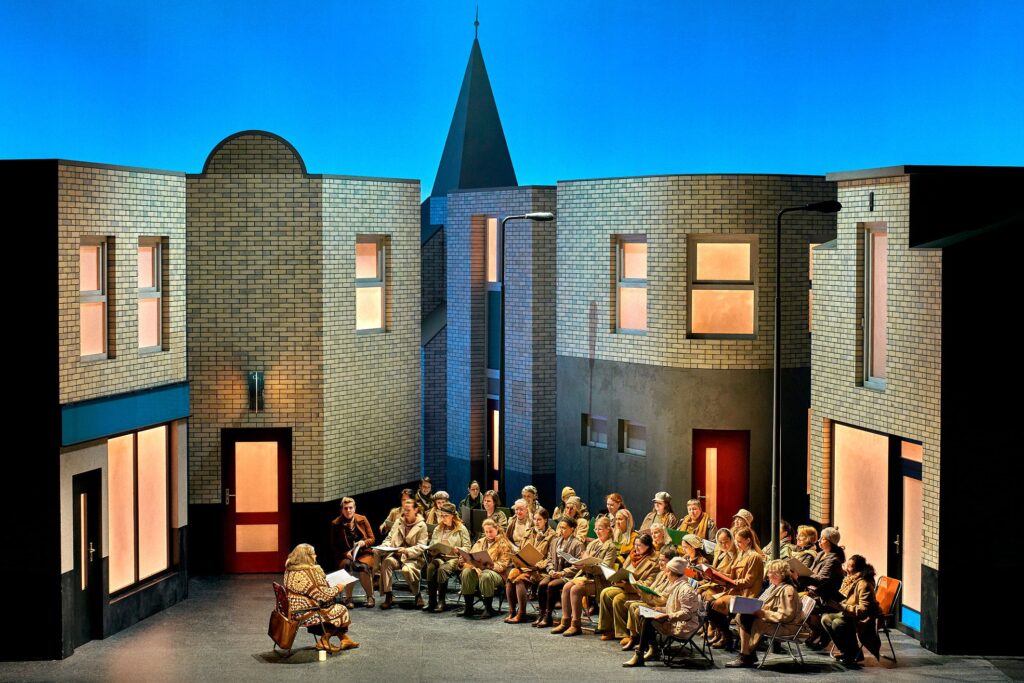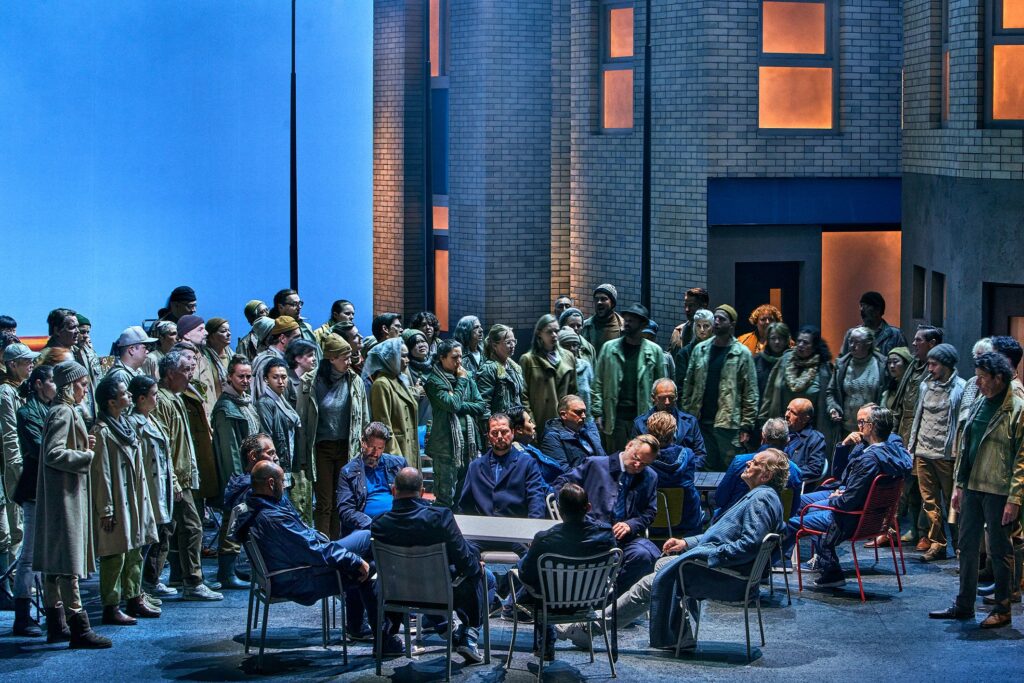Like all productions by Russian revisionist stage director Dimitri Tcherniakov, the Bayreuth 2021 Dutchman production is fraught with meaning, delving deeply into the contemporary resonances he discovers in nineteenth century opera.
This current revival of his Bayreuth Holländer production is enriched by the musical presence of Ukrainian conductor Oksana Lyniv. Mme. Lyniv has much experience with this early Wagner masterpiece, first in Barcelona in 2017, and now, in the Tcherniakov production, every year at Bayreuth since 2021. Thus her very colorful, very direct connection to the opera’s heroine Senta can come as no surprise, though it remains always shocking in effect.
Tcherniakov staged the Dutchman overture as a dream in which the Holländer, as a young boy, watches his mother solicit then have sex with Senta’s father Daland. He watches as the mother, prostituting love, is ostracized by the villagers. In sudden, brutal reaction the mother hangs herself. Discovered by the boy Holländer, he toys with her dangling feet, a Wozzeck-like “hop! Hop!” quote.
Did I get this right? At Bayreuth there are no concessions to an international audience. Bayreuthian hermeticism insisted that the German words projected on a scrim defining the overture’s dream remain untranslated.
Thus the dream informs us that the opera itself will be the Holländer’s revenge on love — not the celebrated Wagnerian ideal of pure love (endlessly discussed in the current Bayreuth Tristan), but love in its most basic bestial and transactional forms. In true Tcherniakov form the Wagnerian tale then became the most tense, cruel moments in the lives of a small Bavarian family in a small Bavarian village. Or somewhere.
At the August 8 performance I attended the Dutchman was portrayed by Polish/Austrian bass-baritone Tomasz Konieczny instead of the announced German bass-baritone Michael Volle, a cast change that greatly enriched and perhaps confused the tonality of the Tcherniakov concept.
Tomasz Konieczny (no photos available) possesses a voice of great presence, of piercing color, a voice that is sexual and predatory. He has a handsome, commanding and authoritarian bearing, becoming a dangerous, fantasy figure. It is as such that he arrived at the village bar/pub where he aggressively expounded his male solitude, attracting the attention of Senta’s father Daland, portrayed by warm, paternally voiced German baritone Georg Zeppenfeld, who has a daughter of marital age.
But Tcherniakov’s Dutchman as portrayed by Mr. Konieczny became less about the Holländer’s revenge, and more about the values of village life, and the force of human instinct that conflicts with such values. Senta possesses such wild, youthful instincts. Her father and mother — in Wagner’s libretto this is Senta’s nurse, Marta — are the family, with its attendant need of wealth and continuity. Marta, as Senta’s mother, was sung by appropriately figured and voiced German (Indiana University trained) mezzo soprano Nadine Weismann.

The spinning chorus in Tcherniakov’s world became a chorus of village women, conducted by Marta, extolling the domesticity of simple life. The rehearsal was brutally interrupted by the fiery Senta, sung by Norwegian soprano Elizabeth Teige with impressive, impatient attitude. Mme. Teige posses a quite beautiful voice that she used with consummate, aggressive skill expounding her quite spectacular ballad telling of the Holländer’s quest for eternal love. She too, in her troubled sexual fantasies seeks love, adding considerable interest to Tcherniakov’s domestic tragedy, echoing the early twentieth century Janacek tragedies.
Senta’s father and mother invited the Holländer to dinner to introduce him to their daughter, a fruitful marriage in their minds. Falling under the Holländer’s spell, Senta needed no such encouragement, though the mother, silent in this scene, became visibly troubled.

Senta however had already pledged her undying love for the villager Eric (lead photo), sung by American Heldon tenor Eric Cutler, who cut loose in fine, heroic voice with his impassioned expectations of Senta. She summarily repulsed him — physical brutality is a Tcherniakov forte. More brutality ensued. The villagers, led by the town drunkard (Wagner’s Steersman, sung by American Helden tenor Matthew Newlin), confronted the band of unknown forces that accompanied the Holländer’s arrival in the village with much bloodshed. This excitement was greatly heightened by the chorus keeping up with the maestra’s breakneck speed for this splendid scene (they did).
At last the Holländer is forced to confront Eric, two powerful male voices, the denouement to unfold, though in the Tcherniakov production there is no ship on which the condemned Dutchman can escape. Marta the mother suddenly appears with a rifle and shoots dead the Holländer, Eric and Senta are left standing on the stage, the myth forgotten as the village is being consumed in flames, Gotterdammerung-like, all this to Wagner’s grandiose music for Senta’s suicide, a death meant to free the Holländer from his cruel fate.
This Tcherniakov denouement, of the many that occur at European opera festivals, is among the richer, laden as it is with Wagnerian humor.
Tcherniakov himself created the setting — a group of village-like bare structures, that, like the villagers dancing in Act III, danced around the stage in varying configurations for the varying plot complexities. These stifling variations were joyously supported by the maestra’s surprising discovery of many bright dance rhythms in the Wagner score. The complex, spectacular lighting was by Tcherniakov collaborator Glen Filshtinsky, the costumes were designed by long-time Tcherniakov collaborator Elena Zaytseva.
Michael Milenski
Wagner Festspielhaus, Bayreuth, Germany, August 8, 2024. All photos copyright Enrico Nawroth, courtesy of the Bayreuth Festival.